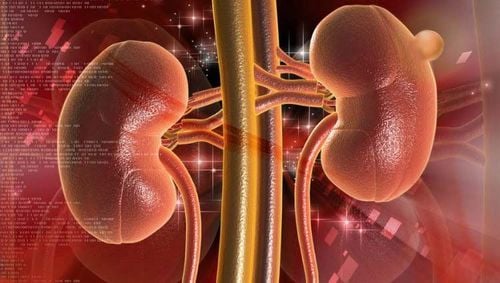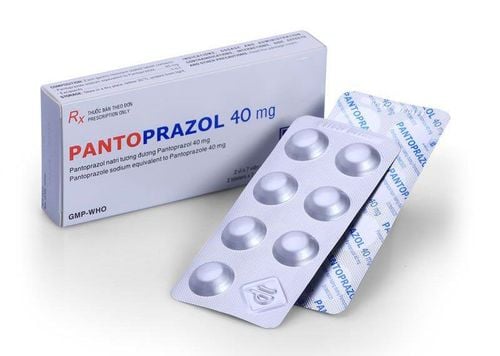This is an automatically translated article.
The article is professionally consulted by Master, Doctor Le Thi Minh Huong - Emergency Medicine Doctor - Department of Resuscitation - Emergency - Vinmec Nha Trang International General Hospital.Glomerulonephritis causes high blood pressure, affects the blood's ability to clean and filter wastes out of the body, and causes generalized swelling. Therefore, many people wonder why glomerulonephritis causes high blood pressure and edema.
1. Symptoms of glomerulonephritis
Glomerulonephritis is an inflammation of the small blood vessels in the kidneys, called the glomeruli. The disease can be acute (sudden onset) or chronic (onset is gradual) and is potentially fatal. When damaged, the kidneys are not able to remove waste and excess fluid effectively. Unfiltered blood and protein are excreted in the urine.Symptoms of glomerulonephritis can vary from patient to patient, but the common ones are:
Dark brown urine due to blood and proteinuria; Sore throat; Small amount of urine; Lack of energy or getting tired easily; Shortness of breath ; Headache; High Blood Pressure; Epilepsy ; Rash, mainly on the buttocks and legs; Weight loss ; Athritis; pale skin; Edema is caused by fluid accumulation in the tissues.

2. Why does glomerulonephritis raise blood pressure?
2.1. The relationship between the kidneys and blood pressure The kidneys receive about 25% of blood flow from the heart, so any abnormal changes in the kidneys or blood pressure can affect each other.High blood pressure has a direct impact on kidney damage, even to the point of being irreversible. Mild manifestation is the appearance of microscopic protein in the urine (albuminuria), more severe is renal artery atherosclerosis. When high blood pressure occurs, the kidney's filter is damaged, making it easier for large molecules (such as proteins) to pass through.
In people with long-term hypertension, the renal artery can be affected, gradually causing fibrosis and stenosis. The higher the blood pressure, the more severe the kidney complications. The ultimate consequence of hypertension affecting the kidneys is chronic kidney failure. At this time, there is no other treatment other than a kidney transplant.
Not only does high blood pressure cause kidney diseases, but conversely, even a small change in kidney function can have an impact on blood pressure. For example, renal artery stenosis is the leading cause of renal and secondary hypertension. In addition, in the treatment of diseases such as acute and chronic glomerulonephritis, nephrotic syndrome, renal failure ...., blood pressure control is indispensable.
2.2. Glomerulonephritis causes hypertension According to many reports, hypertension complications in glomerulonephritis account for a high rate, about 50-54%. Thus, more than half of patients with glomerulonephritis have symptoms of hypertension, which is often difficult to treat and manage well.
Explaining the mechanism why glomerulonephritis raises blood pressure, doctors believe that high blood pressure causes blockage of the "passing artery" in the kidney, leading to a change in kidney size and swelling of the platelets. kidney. This narrowing activates the apparatus near the glomerulus and causes blood pressure to rise, even in some cases, to develop malignant hypertension.
People with diabetic kidney disease have high glucose levels, which causes blood to flow into the kidneys at a higher rate, putting pressure on filtration and increasing blood pressure. Therefore, patients should have good control of their blood sugar through a nutritious, balanced diet and keep their blood pressure in a stable range by taking medication. This can help prevent kidney complications, including glomerulonephritis.
In a nutshell, high blood pressure can damage the kidneys and prevent them from working properly. At the same time, the kidneys play an important role in regulating blood pressure. Glomerulonephritis causes high blood pressure because kidney function is compromised.
3. Why does glomerulonephritis cause edema?
3.1. Features Edema is the most prominent symptom in people with acute glomerulonephritis, with aggressive onset and systemic progression, affecting daily activities and even being life-threatening.Edema is the first clinical sign that the patient feels before the examination. Initially, the body seems to be fatter despite not eating nutritious food, manifested by wearing tight shoes, wearing tight rings or having a scar on the waist on the skin, a bloated belly, a heavy brain... This weight makes the patient tired, lethargic, short of breath and heavy, swollen eyelids when waking up.
Early edema appears in the lower extremities, causing the instep of the foot to thicken, gradually spreading to the ankle, shin, knee and groin area. The skin is shiny, bright white, not palpable ankles or shin bones, when pressed, it is soft and flattened and has signs of edema. In patients who rarely move and often lie in bed, edema is concentrated in the back, buttocks, shoulders, and neck, and pressure ulcers are easy. The tissue of the external genitalia is also swollen, in men the scrotum is tight and heavy as if it is filled with water, in women the lips and vulva are large and swollen.

3.2. Mechanism So why does glomerulonephritis cause edema? In the body, the two kidneys are responsible for filtering toxins, waste products of metabolic processes and eliminating them through urine. When the filter membrane is damaged by glomerulonephritis, large molecules also easily escape, causing the blood protein concentration to drop dramatically. As a result, the intravascular oncotic pressure created by the protein is no longer maintained. The hydrostatic pressure responsible for ejecting blood is increased as a result of hypertension.
When the difference between the hydrostatic pressure and the oncotic pressure is too large, the fluid cannot stay in the vascular lumen but escapes massively into the interstitial tissue. This phenomenon explains why glomerulonephritis causes edema in the whole body, as well as effusion of the pleural space, heart, and abdomen.
3.3. Danger Acute glomerulonephritis leads to many dangerous complications, most of which are consequences of edema. For example:
A lot of fluid escapes into the interstitial tissue, causing the patient to have swelling of the whole body, difficulty walking; Fluid overflows into the pericardium, pleura with too large a volume will collapse the heart chambers, collapse the lungs, compress the circulatory system. Consequences are hypotension, respiratory failure and death; When the circulating volume is not guaranteed, the blood pumped to the organs is in short supply. Insufficient blood supply to the brain will cause confusion, lethargy, coma and coma; Decreased perfusion to the kidneys aggravates renal failure, stagnation of toxic substances in the blood and dysfunction of other organs; When the patient urinates protein, the protein in the blood decreases, leading to malnutrition. At the same time, the immune system is weakened, making the patient more susceptible to other infections in the respiratory and digestive tracts; The coagulation system is affected, increasing the risk of thrombosis and embolism. Eventually, glomerulonephritis can lead to nephrotic syndrome, which causes the person to lose large amounts of protein in the urine. This causes the body to retain more fluid and salt, leading to high blood pressure, increased cholesterol, and swelling throughout the body. If left unchecked and treated with corticosteroids, nephrotic syndrome will progress to end-stage kidney disease - when kidney function appears to be completely failing.
Glomerulonephritis can cause high blood pressure and edema, seriously affecting the health of the patient. Therefore, when seeing abnormal signs of the patient's body, they should go to medical centers for timely examination and treatment to minimize the risk of possible complications.
Vinmec International General Hospital is a general hospital with the function of examining and treating kidney and urinary diseases and many other diseases. At Vinmec, we have also performed endoscopic diagnosis and treatment with modern medical methods for urinary kidney diseases, which not only brings high efficiency but also minimizes complications of recurrent disease. The great success is because Vinmec is always fully equipped with modern facilities, examination and treatment procedures are performed by a team of highly qualified and experienced doctors along with many complete medical services. perfect.
Please dial HOTLINE for more information or register for an appointment HERE. Download MyVinmec app to make appointments faster and to manage your bookings easily.
References: medicalnewstoday.com, webmd.com, healthline.com













